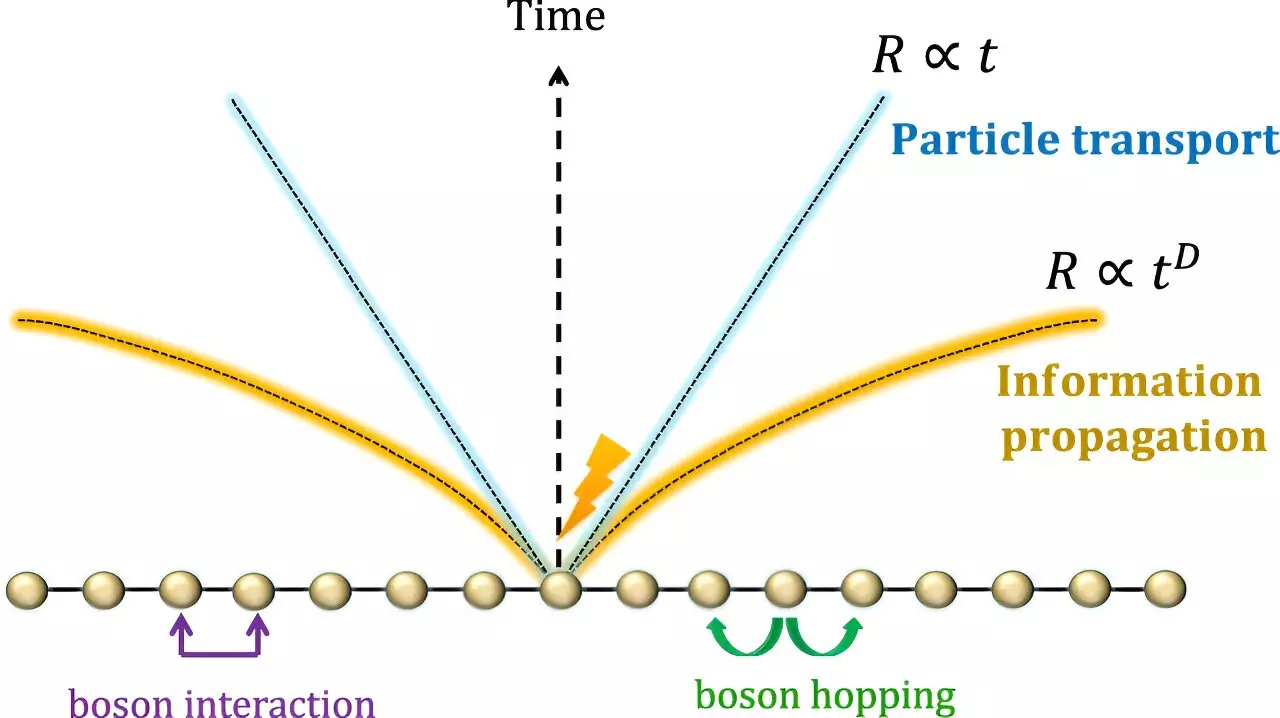In a recent study conducted by researchers from Japan, the propagation of quantum information within interacting boson systems, such as Bose-Einstein condensates (BECs), has been investigated. These findings shed light on the potential for accelerated information transmission in quantum many-body systems, challenging previous assumptions about the limitations of information propagation. Quantum systems consisting of interacting bosons play a crucial role in various fields of physics, making it essential to understand how information spreads within these systems.
The Lieb-Robinson bound serves as a fundamental concept in quantum physics, quantifying the rate at which information or changes propagate through a quantum system. When a change occurs within one part of the system, the Lieb-Robinson bound describes how quickly this change affects other regions of the system. This limitation implies that the influence of an initial change spreads outward from its point of origin, impacting neighboring areas of the system. However, the application of the Lieb-Robinson bound to interacting boson systems has posed a significant challenge in the past.
Dr. Tomotaka Kuwahara and his team from the RIKEN Center for Quantum Computing have tackled the obstacles related to the Lieb-Robinson bound in interacting boson systems in their latest study published in Nature Communications. Dr. Kuwahara emphasized the importance of comprehending quantum systems containing fundamental particles like bosons and fermions. The unique characteristics of boson systems, which have no energy limit in principle, have made the Lieb-Robinson bound particularly complex to establish in such systems.
The researchers chose to employ the Bose-Hubbard model in their investigation of the Lieb-Robinson bound for interacting boson systems on a D-dimensional lattice. This model considers two critical factors: the hopping of bosons between lattice sites and the on-site interaction energy resulting from repulsive forces between bosons occupying the same site. By studying the dynamics of boson transport and error propagation within these systems, the researchers gained valuable insights into the speed and efficiency of information propagation in interacting boson systems.
Contrary to previous assumptions, interacting boson systems exhibit accelerated information propagation due to the clustering of bosons in specific regions. These high-density regions facilitate the rapid transmission of information along certain lattice paths or directions, aligning with the principles of the Lieb-Robinson bound. Although this acceleration is limited and follows a polynomial growth pattern based on the dimensionality of the system, it opens up new possibilities for simulating and understanding the dynamics of interacting boson systems.
Unlike fermionic systems, which demonstrate a finite speed limit for information propagation, bosonic systems show a faster rate of information transmission as more bosons cooperate. The expansion of the light cone in bosonic systems occurs at an accelerated rate, enabling faster information sharing over time. Understanding these distinctions between bosonic and fermionic systems offers valuable insights into quantum information propagation and the potential applications of this knowledge in simulating condensed matter physics and quantum thermalization.
The research conducted by Dr. Kuwahara and his team provides a new perspective on information propagation in interacting boson systems, offering innovative solutions for simulating quantum phases and exploring quantum thermalization. By overcoming the challenges associated with the Lieb-Robinson bound in bosonic systems, this study paves the way for advancements in quantum physics and the discovery of novel quantum phenomena. The insights gained from this research have the potential to revolutionize our understanding of quantum systems and their behavior over time.


Leave a Reply